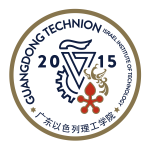14 October 2020
Guangdong Technion - Israel Institute of Technology (GTIIT), China & Technion-Israel Institute of Technology, Israel.
The Physics Program (group of Associate Professor DSc. Dr. Marcelo Ciappina) is looking for 1 PhD student to conduct theoretical research projects in strong field processes in condensed matter related to attosecond physics. Contract duration: 3 + 1 years.
One of the aims of modern digital electronics is to push for smaller and smaller time limits of the constituent elements of integrated circuits, and in this way to offer the possibility to manipulate signals and perform logical operations at a higher speed. Pursuing this goal, the extension of the control of material properties to optical frequencies, instead of the usual microwave or radio fields, has been experimentally presented. To this end, a combination of complex few-cycle pulse-shaping technology with precise nanofabrication techniques were employed. In order to bear the strong electric fields, dielectrics and semiconductors are utilized– in metals the strong screening prevents the formation of high fields and charge density gradients, which makes them fundamentally difficult to control their responses. Fields of such strength and temporal resolution can convert the semiconductor into a conductive material within a field cycle. In order to revert these induced effects, manipulation of the electric field in a comparable time scale should to be achieved. This research proposal aims to predict the field-induced changes in dielectrics and semiconductors, taking into consideration as precisely as possible the experimental conditions and taking full advantage of the applicant's expertise. The potential for signal manipulation and information transference at a bandwidth in the petahertz (1 petahertz=1015 hertz) domain will be aimed. This is at least three orders of magnitude higher than the transmission and processing limits under standard conditions and it is based on the reversibility at a sub-femtosecond (1 femtosecond=10-15 s) time scale of the physical properties of a dielectric or semiconductor. Using different quantum mechanical models (for instance the solution of the Bloch equations) with other numerical and analytical tools (the numerical solution of the time dependent Schrödinger equation for an electron inside a solid material or approaches based on the reduced density matrix), we plan to guide future experimental prospects and to shed light upon unique and fundamental physical phenomena which take place when strong and short coherent electromagnetic radiation interacts with wide band-gap semiconductors and dielectrics. Furthermore, we will look for the ultimate answers of several questions that will be crucial for the implementation of our predictions. For instance, the heat dissipation per duty cycle, phenomenon related with the reversibility of the physical properties of the material, appears to be one of the limiting factors in the speed of the signal manipulation in the actual components of microprocessors. Consequently, an opportunity to increase the clock rate–the frequency at which a microprocessor runs or a transistor is able to follow an electrical signal—is tied to this phenomenon. Its study thus presents an opportunity to reduce this clock rate—a ground- breaking achievement.
Strong field phenomena, numerical modeling, attosecond physics, plasmonics, beam propagation, multiscale modeling, condensed matter
- Master degree (or equivalent) in Physics, Atomic Physics or Condensed Matter (essential)
- Strong background in atomic physics (preferable)
- Strong interest in condensed matter (essential)
- Strong interest in programming and numerical modeling(essential)
- Strong interest to work temporarily at research institutes in China, Europe, Israel and South Korea (essential)
- Good communication skills, good command of English (essential)
- Ability to work independently as well as in a team environment (essential)
- Ability to author scientific reports and co-author scientific publications (essential)
- The PhD candidate must fulfill the requirements for admission to the Technion Graduate School and needs to comply with its regulations leading to the PhD/Master degree: https://graduate.technion.ac.il/en/prospective-students/

